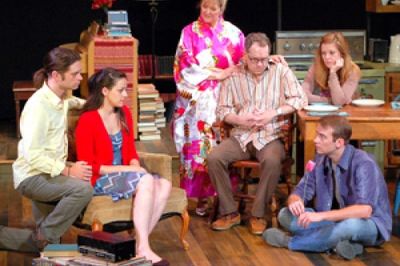Playwright Nina Raine explained in a 2010 interview that she had watched a documentary about a deaf couple who were expecting their first child. The couple were hoping that the child would be born deaf. Raine was struck by that, and from that seed grew her dazzlingly intelligent and challenging play called Tribes, which runs through June 28, closing out the Unicorn Theatre’s current season.
Tribes tells the story of a family: the parents, Christopher and Beth (played with joyously acidic glee by David Fritts and Jan Rogge) and their three grown children, Daniel (Jake Walker), Ruth (Nicole Marie Green) and Billy (Paul Osoki), who are all living at home.
It is an extremely dysfunctional family, and they waste no opportunity to tear each other down. The youngest child, Billy, is deaf; his parents, hoping to help him cope in the world, have taught him how to read lips, but never taught him sign language. Billy meets Sylvia (Lisa Lehnen), who is a hearing woman with deaf parents. She is slowly going deaf and is an expert in sign language, but she cannot read lips. Billy and Sylvia find a connection together. When Billy starts learning sign language and begins to identify with the deaf community, the already fragile bonds holding the family together get stretched to the breaking point.
Now, this is kind of two plays wrapped up into one. You can watch the surface play, following the plot of the main action I described above. And you will get a good story. But the real play takes place beneath the surface. It is a layered battle between context and subtext. It’s a lesson in semiotics. It’s an examination of group affiliations, identity politics, and an example of torn loyalties. It’s intimidatingly intelligent.
Spoken dialogue provides a certain thread through the meanings of the play, and the fact that this is a very foul-mouthed family with cutting humor is very relevant (and here’s a warning: there is a LOT of strong language in this play). The tone of voice that the characters speak with provides another thread of meaning, coloring the actual words in ways that deaf people would be unable to interpret. Sign language (specifically ASL) is a third way of navigating the events on the stage; there is a fair amount of signing done, and screens above the stage translate the signing into English. But sign language lacks the subtlety of spoken communication, and the characters in the play all face that fact as it becomes a more important way of talking to each other. And finally, there is body language. As you pay attention to the characters, you come to realize just why it’s called “body language.” Oh, and Daniel hears voices in his head, which tops everything off. Mixing all four (or five) of these types of communication together, while also exposing their structure and how they affect interpersonal relationships, makes for a complexly layered story.
In order for the play to make its multiple meanings known, it needs to have a cast that can not only be a character in the play, but also make their language a character. This must be a very difficult play to perform, but true to the Unicorn’s reputation, the actors assembled are undaunted and make this work. All of them are perfect fits for their roles, and they make their respective voices heard in the ways they need to.
Most of the actors are professionals, with two notable exceptions. Paul Osoki, who plays Billy, is deaf in real life and teaches at the Kansas School for the Deaf. Lisa Lehnen, who plays Sylvia, has a degree in American Sign Language Interpreting and works as a community interpreter in the Kansas City area. But you wouldn’t know that these two are new to playing leading roles in professional theater. Their life skills helped them fit naturally into their characters, and they are amazing to watch.
If there is a fault with this play, it is that it’s too smart and covers too much ground for most people to absorb in one sitting. It’s a family farce, a romantic drama, and a philosophical frenzy. The characters’ words and actions both clash and mesh with each other, turning verbal fights into symbolic dances – and vice versa. This play requires a lot of attention and work if you are going to really understand it. But it’s worth it. Thoughtful audiences will come out of this play changed from when they went in.
For tickets to Tribes, which runs through June 28, call 816-531-7529 or go to unicorn.org. Certain performances will be interpreted into American Sign Language
